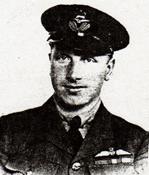John Alcock (aviator)
| Sir John William Alcock | |
|---|---|
 |
|
| Born |
5 November 1892 Seymour Grove, Stretford, England, |
| Died | 18 December 1919 (aged 27) Cottévrard, near Rouen, Normandy, France |
| Buried at | Southern Cemetery, Manchester |
| Allegiance | United Kingdom |
| Service/branch | Royal Navy (Royal Naval Air Service), Royal Air Force |
| Years of service | 1914–1919 |
| Rank | Captain |
| Awards |
Order of the British Empire Distinguished Service Cross Britannia Trophy (posthumous) |
Captain Sir John ('Jack") William Alcock KBE DSC (5 November 1892 – 18 December 1919) was a Royal Navy and later Royal Air Force officer who, with navigator Lieutenant Arthur Whitten Brown, piloted the first non-stop transatlantic flight from St. John's, Newfoundland to Clifden, Connemara, Ireland. He died in a flying accident in France in 1919.
John Alcock was born on 5 November 1892 at Basford House on Seymour Grove, Firswood, Manchester, England. He attended St Thomas's Primary School in Heaton Chapel, and Heyhouses School in Lytham St Annes. He first became interested in flying at the age of 17. His first job was at the Empress Motor Works in Manchester. In 1910 he became an assistant to Works Manager Charles Fletcher, an early Manchester aviator and Norman Crossland, a motor engineer and founder of Manchester Aero Club. It was during this period that Alcock met the Frenchman Maurice Ducrocq who was both a demonstration pilot and UK sales representative for aero engines made by the Italian Spirito Mario Viale.
Ducrocq took Alcock on as a mechanic at the Brooklands aerodrome, Surrey, where he learned to fly at Ducrocq's flying school, gaining his pilot's licence there in November 1912. Alcock then joined the Sunbeam Motor Car Company as a racing pilot. By summer 1914 he was proficient enough to compete in a Hendon-Birmingham-Manchester and return air race, flying a Farman biplane. He landed at Trafford Park Aerodrome and flew back to Hendon the same day.
...
Wikipedia
